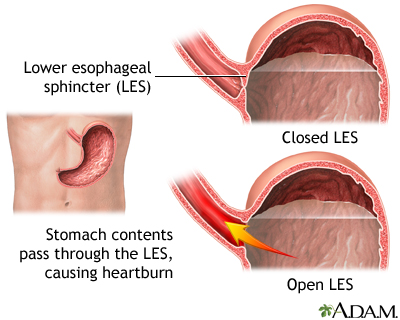
Heartburn - bland diet; Nausea - bland diet; Peptic ulcer - bland diet



A bland diet can be used alongside lifestyle changes to help address the symptoms of ulcers, heartburn, GERD, nausea, and vomiting. You may also need a bland diet after stomach or intestinal surgery.
A bland diet includes foods that are soft, not spicy, and low in fiber. If you are on a bland diet, you should not eat spicy, fried, or raw foods. You should not drink alcohol or drinks with caffeine in them.
Your health care provider will tell you when you can start eating other foods again. It is still important to eat healthy foods when you add foods back in. Your provider can refer you to a dietitian or nutritionist to help you plan a healthy diet.
Foods you can eat on a bland diet include:
Some foods you may want to avoid when you are on a bland diet are:
You should also avoid medicine that contains aspirin, ibuprofen (Advil, Motrin), or naproxen (Aleve, Naprosyn).
When you are on a bland diet:
Moldwin RM, Hanno PM. Interstitial cystitis/bladder pain syndrome and related disorders. In: Partin AW, Dmochowski RR, Kavoussi LR, Peters CA, eds. Campbell-Walsh-Wein Urology. 12th ed. Philadelphia, PA: Elsevier; 2021:chap 57.
Pruitt CM. Nausea, vomiting, diarrhea, and dehydration. In: Olympia RP, O'Neill RM, Silvis ML, eds. Urgent Care Medicine Secrets. Philadelphia, PA: Elsevier; 2018:chap 20.
Thompson M, Noel MB. Nutrition and family medicine. In: Rakel RE, Rakel DP, eds. Textbook of Family Medicine. 9th ed. Philadelphia, PA: Elsevier; 2016:chap 37.
BACK TO TOPReview Date: 5/4/2024
Reviewed By: Stefania Manetti, RDN, CDCES, RYT200, My Vita Sana LLC - Nourish and heal through food, San Jose, CA. Review provided by VeriMed Healthcare Network. Also reviewed by David C. Dugdale, MD, Medical Director, Brenda Conaway, Editorial Director, and the A.D.A.M. Editorial team.

|
A.D.A.M., Inc. is accredited by URAC, also known as the American Accreditation HealthCare Commission (www.urac.org). URAC's accreditation program is an independent audit to verify that A.D.A.M. follows rigorous standards of quality and accountability. A.D.A.M. is among the first to achieve this important distinction for online health information and services. Learn more about A.D.A.M.'s editorial policy, editorial process and privacy policy. A.D.A.M. is also a founding member of Hi-Ethics and subscribes to the principles of the Health on the Net Foundation (www.hon.ch). |
The information provided herein should not be used during any medical emergency or for the diagnosis or treatment of any medical condition. A licensed medical professional should be consulted for diagnosis and treatment of any and all medical conditions. Call 911 for all medical emergencies. Links to other sites are provided for information only -- they do not constitute endorsements of those other sites. © 1997- A.D.A.M., Inc. Any duplication or distribution of the information contained herein is strictly prohibited.